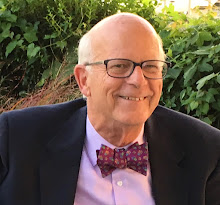The students, that is. They get the whole issue of the call to the least evangelized peoples and their involvement. They really get it and want to see some things happen.
Yes, this comes from my lectures, which have concentrated on the least evangelized nations through my story and Anglican Frontier Missions, and through the history of the early church through the mission of Paul. I thought I would emphaisze something different… Right!
First of all they were a bit skeptical about the pillars of the early church missing the point about the Gentile nations. Then they were caught by surprise to learn that when Peter finally went to the Gentile Cornelius’ house, that was at least six years after the Ascension.
Then I knew I was starting to connect. I brought back the Bishop of Kafanchan as example. I had used him several times as an example of church planting, Nigeria style. You might have seen a posting with that title. Bp. Diya does it well – spots the villages without a church, prepares the ground, has the infrastructure set up, makes the right contacts, and then there is a church.
He was Exhibit A of the first three pieces of the Great Commission found in Acts 1:8: You shall receive power when the Holy Spirit comes upon you, and you shall be my witnesses in Jerusalem, Judea, Samaria, and the ends of the earth.” Bishop Diya holds aces when it comes to Jerusalem, Judea, and Samaria.
With him as Exhibit A, they were able to make the connection in their own hears about the first three.
Then I brought him back as Exhibit A for the ends of the earth – with his work on behalf of the Fulani. Also a posting. That helped the lights to go on. There is a difference between villages without a church and unreached ethnic groups. The least evangelized do exist. The numbers for the Fulani put them near the top – 0.025%. The students can relate to this group of 20 million inside Nigeria.
But then the issue of the work among the Fulani. Is it not simply be recruiting Fulani evangelists? No, it is not.
That is when I asked the questions that a Strategy Coordinator asks:
How much can we learn about them? We put up over 20 items.
What are their needs? Concentrated on health, cattle, education, and food.
Who can help with these needs and where are they? Came up with: Fulani themselves, teachers from Nigerian schools, vets and dentists from Jordan and the Ghana, food from Kafanchan with funds from other Nigerian churches and maybe even some from the US, hospital equipment compliments of my son-in-law,, and prayer support from Nigerians as well as praying people from around the world.
That’s when the excitement level picked up. Of course I had primed them with a study of 1 Corinthians 12, all about lots of members of the Body of Christ, the need for imagination, and the wee matter of diplomacy to get everybody to work together well.
But they got it. Then they wanted to know – how can they get to groups like the Fulani? What is being done in the Anglican Province of Nigeria for them? Is there a network that concentrates on Fulani work? And then a list of suggestions and more questions for me and Bishop Inyom when we meet with the Primate on Monday to talk about Fulani, the Anglican work there, St. Stephen’s in Heathsville, and more. "And, by the way, Archbishop,what about infrastructure, etc."
Subscribe to:
Post Comments (Atom)

2 comments:
Dear Tad, We're so thankful that you are reaching out so eloquently! May God bless you and let everyone "get it" as the students do! If it is not too late, please give our regards to Bishop Diya!
Post a Comment